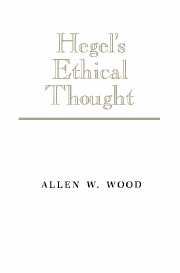13 - The limits of ethics
Published online by Cambridge University Press: 05 June 2012
Summary
The transitoriness of the ethical
In its objective aspect, ethical life is unified in the political state. Through the state people decide how they will live together, and this gives explicit rationality to the whole ethical community. That is why Hegel describes the state as “the actuality of the ethical Idea” (PR § 257), and “the actuality of concrete freedom” (PR § 260). The state is “the actuality of the substantial will, an actuality that it possesses in the particular self-consciousness when this has been raised to universality; as such, it is rational in and for itself” (PR § 258). Hegel even characterizes the state – in what might be regarded as blasphemous terms – as “the presence of spirit in the world” (PR § 270R), an “earthly deity” (PR § 272A), and “the march of God in the world” (PR § 258A).
Hegel intends the terms “earthly” and “in the world” as significant qualifications on the state's claims to divinity. It is only the Idea of the state that Hegel calls “this actual God.” This Idea is distinct from the existing state which, he says, “is no work of art; it exists in the world, and hence in the sphere of arbitrariness, contingency, and error” (PR § 258A). The state belongs to the practical sphere, “the standpoint of the merely finite, temporal, contradictory, and thus transitory, unsatisfied, and unblessed spirit” (VA 1 : 129/128).
- Type
- Chapter
- Information
- Hegel's Ethical Thought , pp. 219 - 236Publisher: Cambridge University PressPrint publication year: 1990

